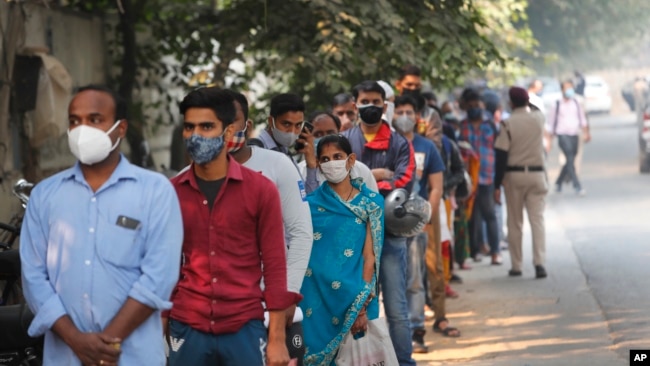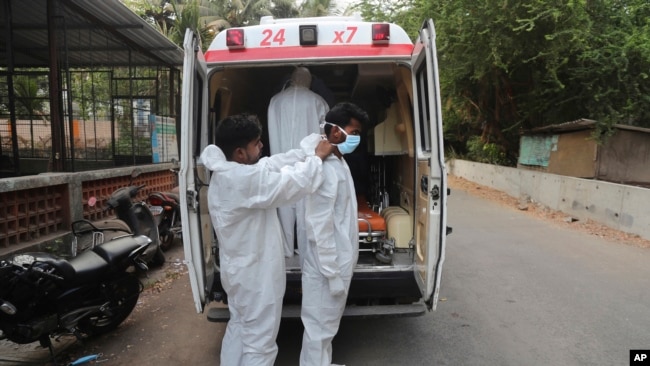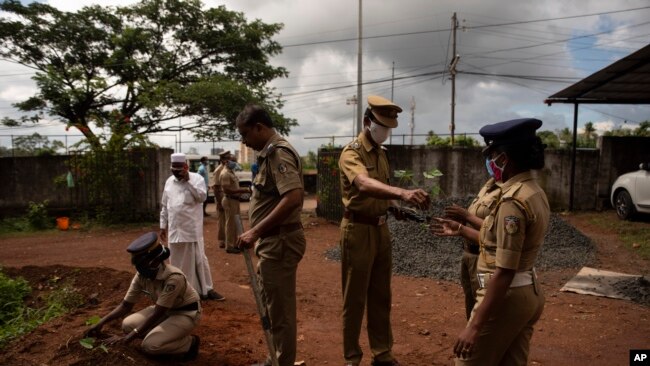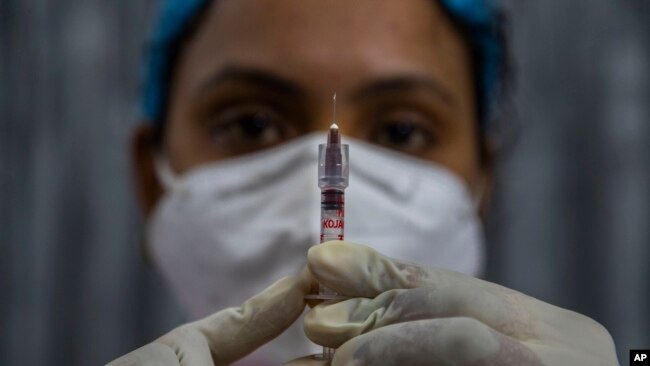インド、コロナ感染者減少の理由は
”Innate immunity”自然免疫が働くとしたのなら、素晴らしい事ですが
歴史の長い時間がかかることです。
ワクチンが全てではないけれど、打つことで少しでも軽い症状で済んで、このウィルスへの免疫を獲得出来れば、次のウィルスへの自然免疫になるかもしれません。
インドは当初一気に感染者が増加しましたが、ここにきて減少に転じていて、研究者たちがその原因をつきとめようとしているステージにまで達している、といVOAニュースに驚きを感じました。
英語で世界を知ろう!!!
インドでコロナウイルスの症例が減少している理由を専門家が疑問視
Experts Wonder Why Coronavirus Cases Drop in India
2 hours ago /2021/02/20
インドの保健専門家は、ここ数ヶ月でコロナウイルスの症例が大きく落ち込んだ原因を突き止めようとしています。
新しい感染症例は昨年インド全土で数ヶ月間上昇していましたが、その後9月に落ち始めました。今が、一日約11,000 の新しい感染を報告しています。それは危機の最悪の期間中であったおよそ100,000 から下っています。
ウイルスを研究している専門家は、インドのほぼすべての部分で起こった突然の低下のための多くの可能な説明を示唆しています。2 つの可能な説明は、国のいくつかの地域が”集団免疫”に達している可能性があります、またはインド人がコロナウイルスからのいくつかの既存の保護を持っている可能性があります。herd immunity 群集免疫とは、ある集団の中で十分な数の人々が病気に抵抗力を持ち、病気が広がらない状態を指します。
インド政府は、この減少は少なくとも部分的には、全国的にマスクを着用していることに起因すると考えていると述べています。インドでは公共の場でマスクを着用することがルールとなっており、一部の都市では強く強制されています。しかし、専門家は、マスク着用が一般的ではない地域でもウイルス感染が減少したと指摘しています。
減少の原因を突き止めれば、コロナウイルスによって引き起こされる病気であるCOVID-19のより良い管理に役立てることができるでしょう。インドでは、約1100万人のCOVID-19の症例と15万5000人以上の死亡者が報告されています。
Shahid Jameel博士はインドのアショカ大学でウイルスを研究しています。「原因がわからなければ、無意識のうちに再燃につながるようなことをしている可能性があるでしょう。」 と、同博士はAP通信に語っています。
インドは、他の国と同様に、多くの感染を見逃しており、ウイルス死をどのようにカウントするかについての疑問がありました。しかし、国の病院への圧迫もここ数ヶ月で低下しています。これは、ウイルスの広がりが鈍化していることを示唆しています。
記録的な感染者数は11月に900万人に達しました。当時の公式情報によると、ニューデリーの人工呼吸器を備えた重症患者用ベッドの90%近くが満床でした。今週は、そのうちのわずか16%が埋まっています。
専門家は、インドは1月に注射を始めただけなので、減少がCOVID-19ワクチンの結果ではないと考えています。彼らは、ワクチン接種プログラムの効果は後になって初めて見られると言います。
Vineeta Bal氏は どのように体が病気と戦うのかをインドの国立免疫研究所で研究しています。彼女は、ウイルス症例の減少は、大規模な地域が集団免疫に到達したことに関連していると考えているとAPに語っています。
しかし、他の専門家は、たとえ一部の地域での集団免疫が減少の原因になっているとしても、人口全体が脆弱なままであると警告しています。つまり、人々は自分の身を守るための対策を継続しなければならないということです。
新しい研究では、あるウイルスの型で病気になった人が、新しいバージョンで再び感染する可能性があることを示唆しています。例えば、バル氏はブラジルのマナウスでの最近の研究を指摘しました。それはそこにいる人々の75%以上が10月にウイルスの抗体を持っていたと推定しました - 症例が1月に再び急上昇する前に。「私は誰もが最終的な答えを持っているとは思わない 」と彼女は言っています。
専門家によると、もう一つの可能性は、多くのインド人が生涯を通じて一連の病気にさらされていることだといいます。そうすることで、新しいウイルスに対する免疫力が高まる可能性があります。インドでよく見られる病気には、コレラ、腸チフス、結核などがあります。
アショカ大学のジャミール博士は、「COVIDウイルスが肺に到達する前に、鼻や喉でコントロールできれば、それほど深刻にはならない」と述べています。「自然免疫はこのレベルで、ウイルス感染を抑えて肺に到達するのを止めようとすることで機能します 」と彼は付け加えています。
感染症の大きな減少でも、インドの保健当局は、新しいウイルスのバージョン、または変異型について、コロナウイルスと戦うための努力を遅らせているとして心配しています。科学者たちは、すでに以前のウイルスバージョンを持っている人々に新しい感染症を引き起こすとして非難されたいくつかの国を含んめ、国内でいくつかの新種型を識別しています。
Experts Wonder Why Coronavirus Cases Drop in India
 In this Nov. 6, 2020, file photo, people queue to get tested for COVID-19 as a thick quilt of smog lingers over New Delhi, India. (AP Photo/Manish Swarup, File)
In this Nov. 6, 2020, file photo, people queue to get tested for COVID-19 as a thick quilt of smog lingers over New Delhi, India. (AP Photo/Manish Swarup, File)
Health experts in India are seeking to find out what caused a major drop in coronavirus cases in recent months.
New infections had climbed for months across India last year, but then began falling in September. Now the country is reporting about 11,000 new cases a day. That is down from nearly 100,000 during the worst period of the crisis.
Experts studying the virus have suggested many possible explanations for the sudden drop, which happened in nearly every part of India. Two possible explanations are that some areas of the country may have reached “herd immunity” or that Indians may have some preexisting protection from the coronavirus. The term herd immunity describes a situation in which enough people in a population are resistant to a disease so that it cannot spread.
The Indian government has said it believes the decrease happened, at least partly, because of mask-wearing across the country. Wearing a mask in public is a rule in India and is strongly enforced in some cities. But experts have noted that virus cases also dropped in areas where mask-wearing was less common.
Finding out causes for the drop could help officials better control COVID-19, the disease caused by the coronavirus. India has reported nearly 11 million COVID-19 cases and over 155,000 deaths.
Dr. Shahid Jameel studies viruses at India’s Ashoka University. “If we don’t know the reason, you could unknowingly be doing things that could lead to a flare-up,” he told The Associated Press (AP).
India, like other countries, misses many infections, and there have been questions about how it counts its virus deaths. But pressure on the country’s hospitals also dropped in recent months. This suggests that the virus’ spread is slowing.
Recorded cases reached 9 million in November. At that time, official information showed that nearly 90 percent of all critical care beds with ventilators in New Delhi were full. This week, just 16 percent of those beds were occupied.
Experts believe the drop cannot be the result of COVID-19 vaccines because India only began giving the injections in January. They say the effects of the vaccination program will only be seen later.
Vineeta Bal studies how the body fights disease at India’s National Institute of Immunology. She told the AP she thinks the drop in virus cases could be related to large areas reaching herd immunity.
But other experts have warned that even if herd immunity in some places is partly responsible for the drop, the population as a whole remains vulnerable. This means people must continue to take measures to protect themselves.
New research suggests that people who got sick with one form of the virus may be able to get infected again with a new version. For example, Bal pointed to a recent study in Manaus, Brazil. It estimated that over 75 percent of people there had antibodies for the virus in October -- before cases saw a sharp rise again in January. “I don’t think anyone has the final answer,” she said.
Experts say another possibility is that many Indians get exposed to a series of diseases throughout their lives. That could help build up immunity against new viruses. Among diseases common in India are cholera, typhoid and tuberculosis.
“If the COVID virus can be controlled in the nose and throat, before it reaches the lungs, it doesn’t become as serious,” said Dr. Jameel of Ashoka University. “Innate immunity works at this level, by trying to reduce the viral infection and stop it from getting to the lungs,” he added.
Even with the major drop in infections, Indian health officials are worried about new virus versions, or variants, slowing efforts to fight the coronavirus. Scientists have identified several new variants in the country, including some blamed for causing new infections in people who already had an earlier virus version.
________________________________________________________________
Words in This Story
mask – n. a covering used to hide or disguise your face
flare-up – n. a situation in which something – such as violence, pain or anger suddenly starts or gets much worse
ventilator – n. a machine that helps a person breathe
vulnerable – adj. easily hurt or harmed physically, mentally, or emotionally
expose – v. to put (someone or something) at risk from a harmful action or condition
immunity – n. to be protected against catching a disease
innate – adj. inborn or natural


